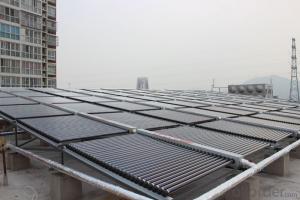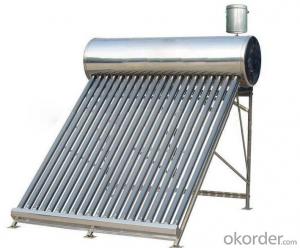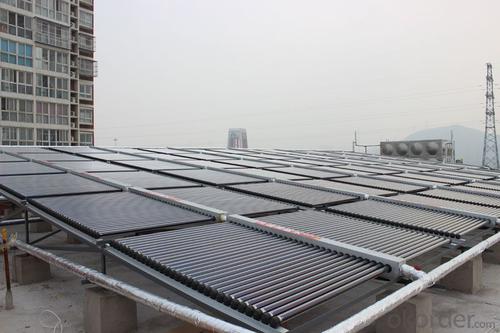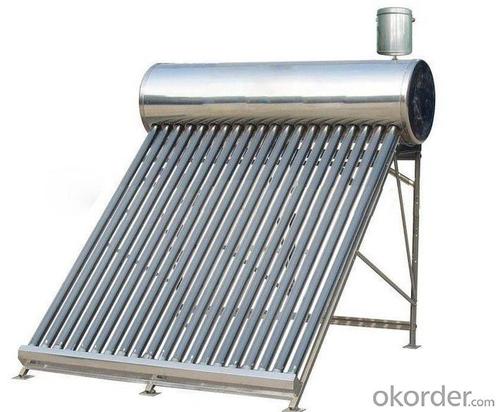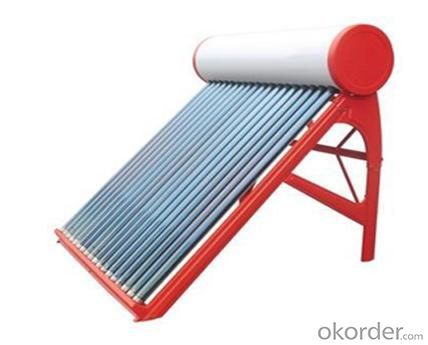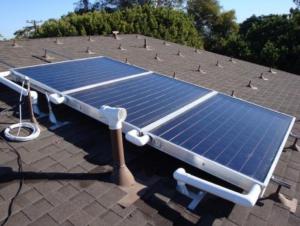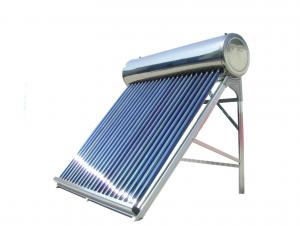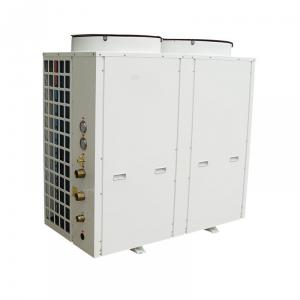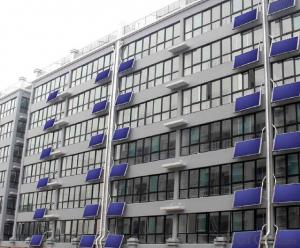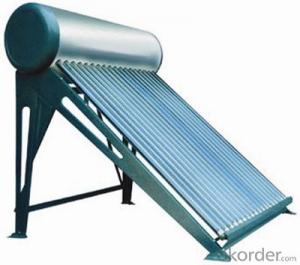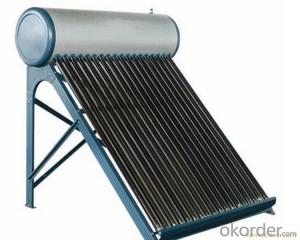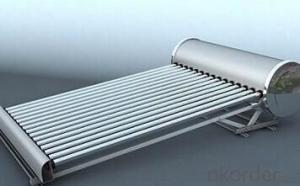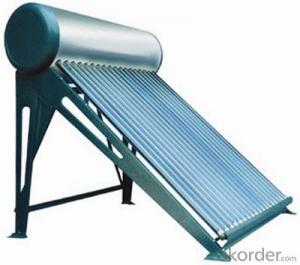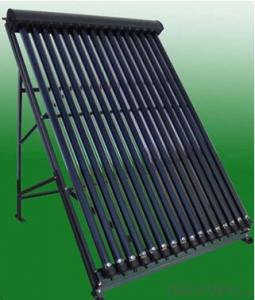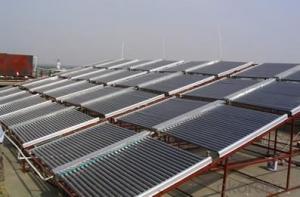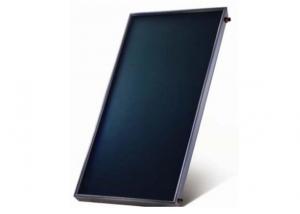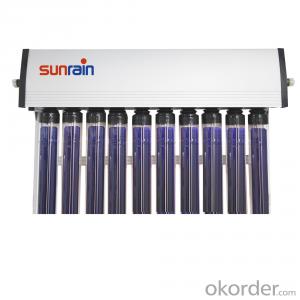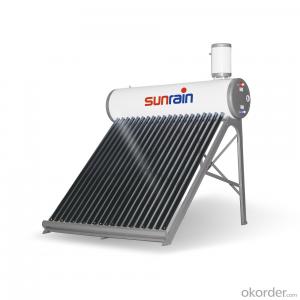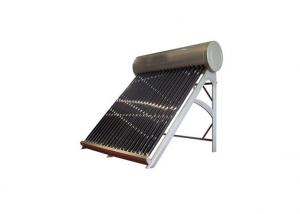150L Passive Solar Water Heater - Stainless Steel Solar Powered
- Loading Port:
- China main port
- Payment Terms:
- TT OR LC
- Min Order Qty:
- 10 set
- Supply Capability:
- 5000 set/month
OKorder Service Pledge
OKorder Financial Service
You Might Also Like
Working Principle of Domestic Solar Water Heaters:
Solar energy, in essence, is an electromagnetic wave, a type of strong optical radiation, which is produced by thermonuclear fusion reaction. The energy of the solar radiation is transmitted through the liught of different wave length. The solar water heater is designed to mainly take in the energy of visible light & near ultra red light through the selective absorbing coating of vacuum tubes.When the water in the solar collector is heated by the solar radiation, its temperature rises. As a result, the water in the solar collector and the water in the tank form natural convection because of density contrast casued by the temperature difference. So the water of the higher temperature is incessantly forced into the insulated solar water tank( As shown in the figure).
Features
<1> Imported SUS304-2B food-level stainless steel,thickness:0.31~0.5mm
<2> Outer tank: High quality stainless steel,thickness:0.31~0.5mm
<3>Insulation: 50~55mm polyurethane foam
<4> Vacuum tube: CU/SS-AL/N red tube
<5> Frame: Stainless steel/Aluminum alloy,thickness:1.2~2mm
<6> Reflector: Stainless steel/Aluminum alloy as option
<7> Available accessories: Feeding tank,solar controller,electric heater, Mag rod,thermostatic mixing valve
Specification
ITEM.NO | SPECIFICATION | EFFECTIVE LIGHT AREA | TANK'S CAPACITY | APPLICATION PEOPLE | CBM | |||
DIAMETER OF WATER TANK | QTY OF TUBE(pcs) | DIAMETER OF TUBE | LENGTH OF TUBE | |||||
Z-NS5810 | 460mm | 10 | 58mm | 1.8m | 1.04 | 100L | 4 | 0.37 |
Z-NS5812 | 460mm | 12 | 58mm | 1.8m | 1.25 | 120L | 4-5 | 0.44 |
Z-NS5815 | 460mm | 15 | 58mm | 1.8m | 1.56 | 150L | 6 | 0.56 |
Z-NS5818 | 460mm | 18 | 58mm | 1.8m | 1.87 | 180L | 7-8 | 0.64 |
Z-NS5820 | 460mm | 20 | 58mm | 1.8m | 2.08 | 200L | 8 | 0.7 |
Z-NS5825 | 460mm | 25 | 58mm | 1.8m | 2.61 | 250L | 10 | 0.89 |
Z-NS5830 | 460mm | 30 | 58mm | 1.8m | 3.13 | 300L | 12 | 1 |
Z-NS5836 | 460mm | 36 | 58mm | 1.8m | 3.75 | 360L | 14-15 | 1.3 |
Z-NS5840 | 460mm | 40 | 58mm | 1.8m | 4.17 | 400L | 16 | 1.4 |
Z-NS5845 | 460mm | 45 | 58mm | 1.8m | 4.69 | 450L | 18 | 1.6 |
Product Details Show:
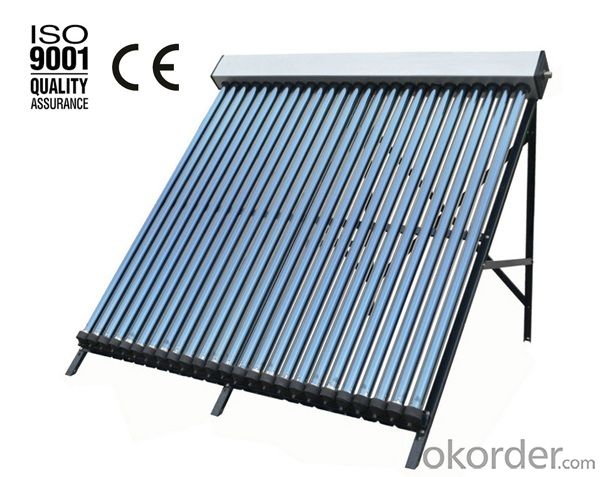
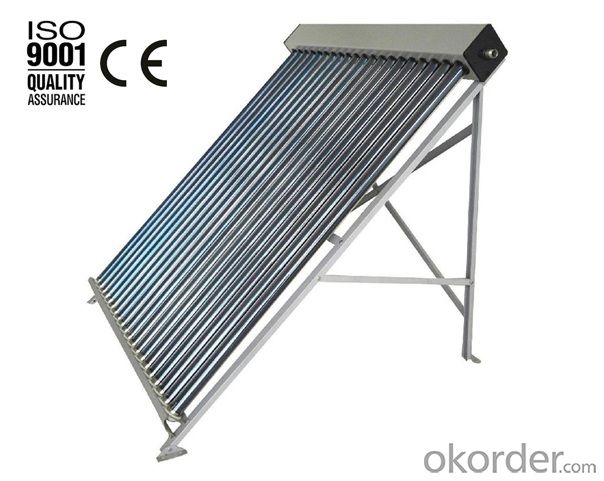
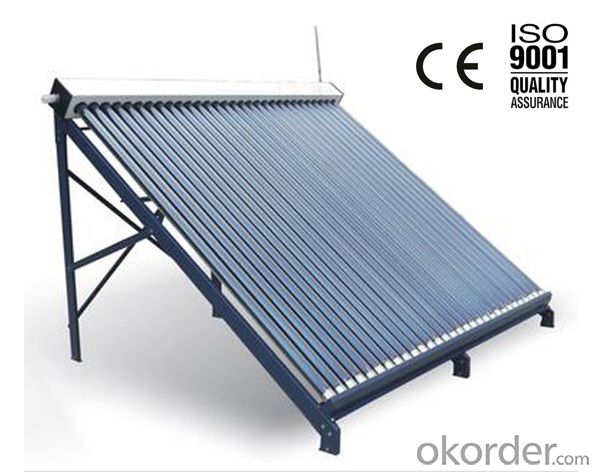
FAQ
1. Q: Are you a factory or trading company?
A: We are a factory. Especially for Solar Controller, PWM solar controller 50A12V/24V
2. Q: Where is your factory located? How can I visit there?
A: Our factory is located in Guangzhou, China. You are warmly welcomed to visit us!
3. Q: what other product you have except such Solar Lighting?
A: We have poly ,mono cells and panels. Off grid solar system, like off grid solar inverter, pure sine wave inverter, solar collector, solar controller, solar charger, Portal solar system, battery, DC Fan, Solar Led Light.
4. Q: Can the price be cheaper?
A: Of course, you will be offered a good discount for big amount.
5. How can I get a sample?
A: Please call us or send email for asking the samples.
- Q: How does a solar water heater affect carbon footprint?
- Utilizing a solar water heater can make a significant difference in reducing one's carbon footprint. Unlike traditional water heaters that depend on non-renewable sources like gas or electricity generated from fossil fuels, solar water heaters harness the energy from the sun to heat water. This means that they produce absolutely no greenhouse gas emissions while operating, resulting in a substantial decrease in carbon emissions. By harnessing solar energy, a water heater can help alleviate the dependence on fossil fuels for the energy-intensive process of heating water, which accounts for a significant portion of a home's energy consumption (up to 18%, according to the U.S. Department of Energy). This reliance contributes to a substantial carbon footprint. By transitioning to a solar water heater, this energy demand can be met with clean and renewable energy, leading to a noteworthy reduction in carbon emissions. Furthermore, solar water heaters are highly efficient and can provide hot water all year round, even in colder climates. This diminishes the need for backup heating systems, thus further reducing overall energy consumption and carbon emissions associated with water heating. Moreover, the installation of a solar water heater also brings positive effects to local communities and the environment. By encouraging the use of renewable energy, it helps diminish the demand for non-renewable energy sources, consequently reducing the extraction and combustion of fossil fuels. This results in a decline in air and water pollution, as well as the associated adverse health effects. To sum up, a solar water heater effectively reduces one's carbon footprint by utilizing clean and renewable energy for water heating, minimizing reliance on fossil fuels, and decreasing carbon emissions. It presents an efficient and sustainable solution to lessen environmental impact and promote a greener future.
- Q: Can a solar water heater be used for heating water for a hydronic heating system?
- Yes, a solar water heater can be used for heating water for a hydronic heating system. The solar water heater can heat the water and then transfer it to the hydronic heating system, which uses water to distribute heat throughout a building. This can help to reduce energy costs and reliance on traditional heating methods.
- Q: How does the type of insulation used in a solar water heater impact its performance?
- The type of insulation used in a solar water heater significantly affects its performance. Insulation helps to minimize heat loss from the water tank, ensuring that the heated water stays hot for longer periods. Good insulation reduces energy wastage, allowing the system to efficiently heat water even in colder climates. An effective insulation material with high thermal resistance helps maintain the desired temperature inside the tank, improving the overall performance and energy efficiency of the solar water heater.
- Q: Solar water heater can be installed with pressure pump, how to add, how much? Easy to use?
- Install pressure pump step:1, remove the intake pipe.2, the pressure on the end of the booster pump received water inlet pipe, one end of the water faucet
- Q: Can a solar water heater be used in areas with limited access to hot water storage tanks?
- Yes, a solar water heater can be used in areas with limited access to hot water storage tanks. Solar water heaters do not necessarily require a dedicated storage tank for hot water. They can be designed to provide hot water directly on demand, eliminating the need for a separate storage tank. This makes solar water heaters a flexible and feasible option for areas with limited access to hot water storage tanks.
- Q: How does the location of the solar water heater affect its efficiency?
- The location of a solar water heater can significantly impact its efficiency. Ideally, solar water heaters should be positioned in areas that receive ample sunlight throughout the day. Placing the heater in a location with direct and unobstructed access to sunlight will ensure maximum efficiency. If the solar water heater is installed in a shaded area or in a location where it is frequently blocked by trees, buildings, or other structures, it will receive less sunlight and therefore produce less heat. This can lead to reduced efficiency and lower water temperatures. Furthermore, the orientation and tilt angle of the solar collector can also affect its efficiency. In the northern hemisphere, for example, the collector should face south to maximize sun exposure. The tilt angle should be adjusted to match the latitude of the installation site. Incorrect orientation or tilt angle can result in reduced efficiency as the collector may not receive optimal sunlight. Additionally, the location's climate can impact the efficiency of the solar water heater. Areas with more sunshine and higher average temperatures will generally yield better results. Cold climates or regions with frequent cloudy days may experience decreased efficiency as the solar collector may struggle to generate enough heat. In conclusion, the location of a solar water heater is crucial for its efficiency. Placing it in an area with ample sunlight, minimal shading, correct orientation, and tilt angle will maximize its performance and ensure optimal water heating capabilities.
- Q: What are the environmental benefits of using a solar water heater?
- Using a solar water heater has several environmental benefits. Firstly, it reduces the reliance on fossil fuels for heating water, thereby reducing greenhouse gas emissions and mitigating climate change. Additionally, solar water heaters utilize renewable energy from the sun, which is an abundant and clean source of power. By harnessing solar energy, they decrease the demand for electricity, reducing the need for conventional power plants that often contribute to air and water pollution. Overall, solar water heaters have a positive impact on the environment by promoting sustainability and reducing the carbon footprint associated with water heating.
- Q: Can a solar water heater be used in areas with limited access to energy policies?
- Yes, a solar water heater can be used in areas with limited access to energy policies. Solar water heaters depend on sunlight to heat the water, and as long as there is ample sunlight in the area, they can operate efficiently and effectively. Since they do not rely on traditional energy sources like electricity or gas, solar water heaters can be a viable solution for regions without established energy policies or limited access to conventional energy sources. They provide a sustainable and cost-effective alternative for heating water, reducing reliance on non-renewable energy and contributing to a greener and more self-sufficient energy system.
- Q: Can a solar water heater be used in areas with limited access to grid electricity?
- Yes, a solar water heater can be used in areas with limited access to grid electricity. Solar water heaters rely on the energy from the sun to heat water, making them a viable option in locations where grid electricity is not readily available. By harnessing solar power, these systems can provide hot water without relying on traditional electricity sources, providing a sustainable and efficient solution for areas with limited access to the grid.
- Q: Can a solar water heater be used in commercial buildings?
- Yes, a solar water heater can definitely be used in commercial buildings. In fact, solar water heaters are a popular and efficient choice for commercial buildings due to their ability to provide a cost-effective and sustainable source of hot water. They can be installed on the roof or any suitable space to harness solar energy and heat water, helping businesses reduce their carbon footprint and save on energy costs.
Send your message to us
150L Passive Solar Water Heater - Stainless Steel Solar Powered
- Loading Port:
- China main port
- Payment Terms:
- TT OR LC
- Min Order Qty:
- 10 set
- Supply Capability:
- 5000 set/month
OKorder Service Pledge
OKorder Financial Service
Similar products
Hot products
Hot Searches
Related keywords
